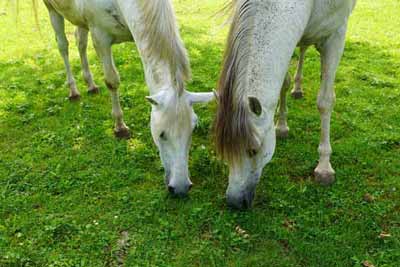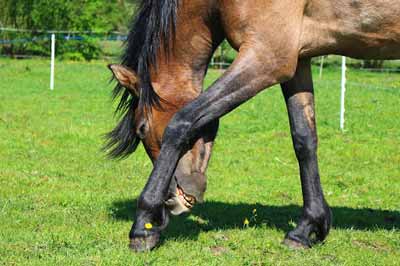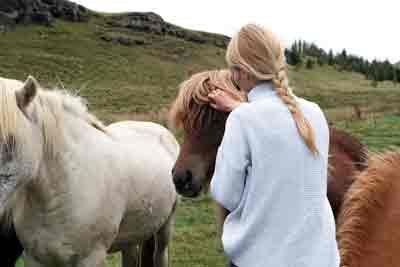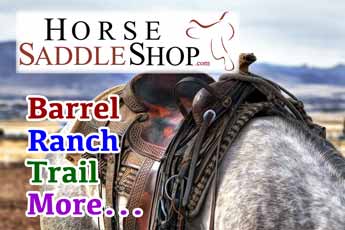By guest author Thomas Brown, Horsezz.com
What Is Deworming Your Horse: Things To Consider
Worms are a common problem among many species, and horses are not an exception.
These parasites can live in the intestines for a long period of time and you can not even know about it. A low number of worms make no harm to a horse, however, excessive parasites may cause severe health issues. Thus, it’s vital to discover the problem before at an early stage.

You should constantly keep your horse’s well-being under the radar to control the population. Therefore, we decided to outline some crucial aspects that have to be considered about horse deworming.

Image by rihaij on Pixabay
Disclaimer
CowboyWay.com does not warrant the accuracy or timeliness of any of the
information found on the CowboyWay.com website, and does not accept liability
for errors or omissions.
In addition, anything found on CowboyWay.com
is not intended to replace veterinary care for your horse or other animals. Always
consult a veterinarian or other trained animal health care professional
regarding any information that may be found here, and/or regarding the
health or health care of your animals.
The Most Common Types of Worms
There are several species of parasites that could be found in horses. These worms can get into an animal in different ways and cause a range of symptoms.
Strongyloides Westeri
Strongyloides Westeri is a threadworm that infects young foals. The parasites are transmitted from mares with milk. Thus, it’s crucial to check a gestated mare for worms on an ongoing basis. If the helminths (worms) are under control, the foal will develop a strong immune system to handle the worms. In case of severe infection, diarrhea and dermatitis may occur.
Larval Cyathostomes
These are small red worms that can be eaten by a horse with grass on pasture. The larvae reproduce in the large intestine, then they grow up and lay eggs. The eggs come out with horse’s feces and they become larvae over time. That’s the lifecycle of Larval Cyathostomes.
This species needs specific conditions to start growing. Usually, they start developing in spring when it’s getting warmer. Until that time, they may survive in the intestine. The common symptoms of the redworms are diarrhea, weight loss, gas, colic, and lethargy.
Strongyles
Strongylus Equinus is a species of large red worms that have a similar lifecycle to Larval Cyathostomes. They could be swallowed with grass when a horse is grazing around. When the larvae hit the recipient, they go through the blood vessels of the liver and intestine. This may lead to inflammation and vessel obstruction. The mains symptoms include diarrhea, gas, and colic.
Lungworm
As its name implies, the lungworms (Dictyocaulus Arnfieldi) is a parasite that may be found in the lungs. Usually, donkeys can transmit the larvae to horses, however, the horse-to-horse transmission also takes place. When the donkey’s infected feces gets onto the pasture, the horse may pick up the larvae by eating the grass nearby.
The signals you should be aware of include lung sounds in horses. The prolonged worm living may lead to bronchitis and pneumonia. Additionally, the symptoms are diarrhea, weight loss, and colic.
Tapeworms
Tapeworms (Anoplocephala Perfoliata) are the parasites migrating through the intestine. The mite serves as a host that typically live on pasture and hay. Mites eat the larvae eggs, horses eat mites, and get infected. The common symptoms of tapeworms are diarrhea, and weight loss. As well as severe colic that may need emergency surgery.
Bot Fly Larvae
Gasterophilus Intestinalis occur from botflies. The adult flies lay eggs on horse’s legs and when horses lick their limbs, the eggs get into an animal. Gasterophilus Intestinalis develop in the stomach, which may lead to ulceration and ruptures. The Botfly Larvae signs are the inflamed mouth and colic.

Image by Tatiana on Pexels
Horse Deworming Guidelines
In order to keep the helminths under control, regular deworming is needed. Here’s a list of useful tips that you should keep in mind.
- Before deworming, you can get a fecal egg count (FEC) done. The horse feces is tested for counting the number of eggs. Depending on the results, a vet recommends whether or not to deworm the horse.
- The FEC is recommended to take in spring and double-checked in fall.
- The deworming process is typically made one to four times a year. The precise number is prescribed by your veterinarian based on the state of health.
- Pregnant horses should be dewormed in spring before foaling. But don’t deworm a gestated mare one month before giving birth.
- If a foal has worms, you should provide proper deworming. The first session is generally taken at the age of 2 months old. And it’s better the repeat deworming every two months till the age of 12 months old. Depending on the fecal egg count results, deworming may be prolonged.
Provide Worm-Free Surroundings
A few actions should be taken in order to control the helminths’ intrusion. They may reduce the chance of getting complications and repeated infection.
- Harrow and mow your pasture in order to kill the larvae and eggs on the grass.
- Clean the manure regularly to avoid your horse grazing in the area.
- Split the pasture into several spots to keep the horse on one of the zones while the rest of the territory is being cleaned.
- Don’t turn out a big number of horses at once, if possible. This may help to reduce the risk of helminths transmission. The same goes for other animals.
- Keep the feeders out of the ground to avoid contacting with the manure.
- Clean the stalls timely, especially after deworming. This can prevent repeated infestation.
The Bottom Line
Look after your horses carefully and in case of health worsening, contact your vet with no hesitation. Immediate actions may prevent severe health issues, so your companion will live more comfortably. Discuss a deworming schedule with your veterinarian to control the infection. Stay healthy!
This article was contributed by guest author Thomas Brown for Horsezz.com
About The Author
The team at Horsezz.com is focused on helping you find horse-related facilities and services near you. Their directory of boarding facilities, veterinarians, riding instructors, fence builders, and more is designed to help you find what you and your horse need in your own area.
What Is / Are...
… What Are 5 Of The Biggest Wild West Robberies?
… What Are 5 Reasons Horse Trailer Lighting Matters?
… What Are 8 Dumb Things To Say To A Horse Lover?
… What Are 9 Proven Ways To Keep Flies Off Horses?
… What Are Chestnuts and Ergots?
… What Are The Parts Of A Western Saddle?
… What Are Saddle Rigging Positions?
… What Are Some Fencing Options?
… What Are Some Foods Both Horses And Dogs Can Eat?
… What Are Some Horse Fencing Basics?
… What Are Some Interesting Horse Facts?
… What Are Some Interesting Charts and Graphs With Horse Information?
… What Are Some Options For Temporary Horse Fencing?
… What Are Synthetic Saddles Made Of?
… What Are The Rodeo Catch Pens?
… What Are The 10 Best 3-Horse Trailers With Living Quarters In The USA And Canada?
… What Are The X's In A Cowboy Hat?
… What Are The Three Legal Head Catches?
… What Is The Angle System For Branding?
… What Is The Barrel Racing Pattern?
… What Is A Bull Riding Vest Made Of?
… What Is Deworming Your Horse?
… What Is A Domain Name?
Why would I need one for my farm or ranch even if I don't have or
want a website?
… What Is A Fifth Wheel Trailer Hitch?
… What Is Flag and National Anthem Etiquette At A Rodeo?
… What Is A Slant Load Horse Trailer?
… What Is Floating A Horse's Teeth?
… What Do Horse Freeze Brands Look Like?
… What Is A Galvayne's Groove?
… What Is A Gooseneck Trailer Hitch?
… What Is Some History About The First National Finals Rodeo?
… What Is The History Of The Modern, Hornless, Bronc Riding Saddle?
… What Is The History Of The Modern Rodeo Bucking Chute?
… What Is The History Of The One-Hand Bareback Rigging?
… What Is The Nasolacrimal Duct In Horses?
… What Is A Pony Express Mochila?
… What Is Hermann Oak Leather?
… What Is Larvicidal De-Worming?
… What Is The Flehmen Response?
… What Is The Rodeo Return Gate?
… What Is A Safety Tip For Posting The Colors?
… What Is A Slick Fork Saddle?
… What Is A Swell Fork Saddle?
You Might Also Like
